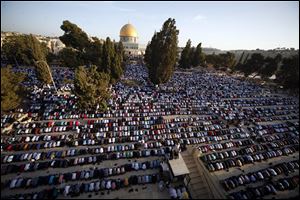
Trump to declare Jerusalem Israel capital
12/5/2017
In this Sept. 24, 2015 file photo, Palestinians pray during the Muslim holiday of Eid al-Adha, near the Dome of the Rock Mosque in the Al Aqsa Mosque compound in Jerusalem's old city. Saudi Arabia has spoken out strongly against any possible U.S. recognition of Jerusalem as Israel’s capital.
WASHINGTON — President Trump forged ahead Tuesday with plans to recognize Jerusalem as Israel’s capital despite intense Arab, Muslim, and European opposition to a move that would upend decades of U.S. policy and risk potentially violent protests.
Mr. Trump also told the leaders of the Palestinian Authority and Jordan in phone calls that he intends to move the U.S. Embassy in Israel from Tel Aviv to Jerusalem. It remains unclear, however, when he might take that physical step, which is required by U.S. law but has been waived on national security grounds for more than two decades.
He won’t move the embassy immediately.
President Trump is to publicly address the question of Jerusalem on Wednesday.
U.S. officials familiar with his planning said he would declare Jerusalem as Israel’s capital. The United States has never endorsed the Jewish state’s claim of sovereignty over any part of Jerusalem and has insisted its status be resolved through negotiation.
The mere consideration of Mr. Trump changing the status quo sparked a renewed U.S. security warning on Tuesday. America’s consulate in Jerusalem ordered U.S. personnel and their families to avoid visiting Jerusalem’s Old City or the West Bank, and urged American citizens in general to avoid places with increased police or military presence.
Mr. Trump, as a presidential candidate, repeatedly promised to move the U.S. embassy. However, U.S. leaders have routinely and unceremoniously delayed such a move since President Bill Clinton signed a law in 1995 stipulating that the United States must relocate its diplomatic presence to Jerusalem unless the commander in chief issues a waiver on national security grounds.
President Trump is likely to do the same, U.S. officials said, though less quietly. That’s why he plans to couple the waiver with the declaration of Jerusalem as Israel’s capital, according to the officials who weren’t authorized to speak publicly on the matter and demanded anonymity. Key national security advisers including Secretary of State Rex Tillerson and Defense Secretary Jim Mattis have urged caution, according to the officials, who said Mr. Trump has been receptive to some of their concerns.
Jerusalem includes the holiest ground in Judaism. But it’s also home to Islam’s third-holiest shrine and major Christian sites, and forms the combustible center of the Israeli-Arab conflict. Any perceived harm to Muslim claims to the city has triggered volatile protests in the past.
Within the Trump Administration, officials on Tuesday were still debating the particulars of the President’s expected speech.